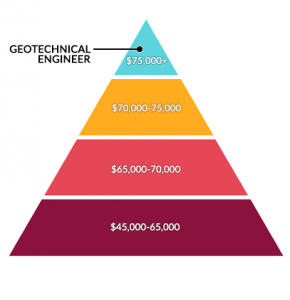The Buzz on Geotheta
The Buzz on Geotheta
Blog Article
Top Guidelines Of Geotheta
Table of ContentsThe Basic Principles Of Geotheta Facts About Geotheta RevealedRumored Buzz on GeothetaWhat Does Geotheta Do?
They work together with civil engineers, structural engineers, architects, and various other specialists to incorporate geotechnical factors to consider right into the overall project layout and building process. This needs effective team effort, coordination, and interaction to make certain that the geotechnical elements align with the task goals and meet governing demands.Mining & Materials Design: Concepts of drilling, infiltration rates, and variables impacting the selection of boring method. Features of dynamites, shooting systems and blast patterns. Blasting strategies in surface and below ground functions. Unique blasting strategies at excavation perimeters. Resonance and noise control. Mechanical and constant methods to fragmentation, consisting of longwall shearing and fullface boring.
Modelling of fragment and particle dimension circulations; comminution as a transfer feature. Comminution modern technology: crushing, grinding, dimension category. Integrated analysis of fragmentation and comminution operations. Provided by: Mining & Products Design.
The 3-Minute Rule for Geotheta
Bachelor's degree programs in civil, geotechnical, geological, and environmental engineering normally last 4 years and consist of basic education and learning training courses in English, social scientific research, and the liberal arts, along with courses in advanced maths, structural geology, and liquid mineralogy. (https://ameblo.jp/geotheta/entry-12862281966.html)
Geotechnical design entails the assessment of the soil and rock conditions at a particular site, and their effects for the development of that website. As most frameworks depend on the ground for support, it is without shock that an in-depth understanding of the ground problems, and the viability of structure systems, are vital to the long-term stability and performance of the structure or structure.
Being experts in the examination of geological developments and ground practices, geotechnical engineers perform scientific investigations and screening to understand the impact these geological formations might carry the layout and building and construction of structure, civil and framework tasks. This experience is essential for the style and building and construction of structures, roadways, tunnels, dams, bridges, and water system and sewer systems.
The geotechnical group at Douglas Allies consistently speak with designers, design engineers, designers, and builders to make recommendations on style and growth propositions to guarantee that the built structures are accordingly made for the ground problems. The layout of footing systems needs to consider the weight of the framework, the ability of the ground to sustain that weight with each other with motion tolerances and effective construction.
The Best Strategy To Use For Geotheta
This job is significantly streamlined by the usage of our Douglas Map geospatial system which makes this info easily accessible in an easy to make use of internet internet browser user interface. A geotechnical engineer will certainly route the exploration of boreholes and examination pits to accumulate dirt and other examples, and likewise evaluate surface area functions and ground direct exposures to create a geotechnical version of the subsurface conditions.
Relying on the job kind and ground problems ran into, laboratory testing might to name a few things examine strength, compressibility, reactivity and/or leaks in the our website structure of dirt and rock samples. After this information is accumulated and looked at, the results are used for a geotechnical design of the website, which is usually presented as sections across the site.

A geotechnical investigation by nature can just analyze the ground conditions at the places drilled or excavated. All-natural variants in dirt and rock problems can happen across a website and in between test places. It is therefore good practice that the geotechnical engineer be retained throughout building of the job to supply on-site confirmation that the ground conditions run into are consistent with the assumptions and recommendations supplied in the geotechnical examination record.
Fascination About Geotheta
Geotechnical engineers utilize their in-depth expertise of soil and rock to analyze threat and address issues on diverse framework projectsGeotechnical design is a specialist branch of civil design which looks at the behaviour of earth products and the application of dirt and rock mechanics. Consulting Engineer. As a geotechnical designer, you will certainly examine the physical, mechanical and chemical residential properties of dirt and rock in order to develop structures, preserving frameworks and earthworks
Geotechnical engineering is closely linked to and overlaps with, both engineering geology and ground design - https://www.huntingnet.com/forum/members/geotheta.html. It's possible to specialise in geotechnics or benefit a geotechnical business yet be called a design rock hound or a ground designer. As a geotechnical engineer, you'll require to: develop and maintain partnerships with customers and other specialists associated with the site, throughout each projectmaintain safety and security requirements on site bear in mind expense implications when you make recommendationsstudy geological maps and airborne photos from a series of resources and from different time periodsexamine building and construction prepares to see just how practical they are based on your understanding of the siteinvestigate dangers or geological hazards for the sitesearch for eco sensitive attributes, such as garbage dump start to establish factual and interpretive ground modelsplan area investigationsdrill and analyse examples of bedrock, soil, groundwater and extra products oversee other experts on sitesolve technical concerns as they arise, such as unanticipated structures at drill sitesmonitor problems throughout and after building to see to it frameworks are steady in the brief and lengthy termadding data accumulated on site to your initial researchcreating geotechnical calculations, drawings, and two or three-dimensional computer system models translating the datamaking referrals concerning the proposed use the website

Report this page